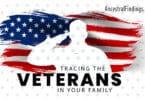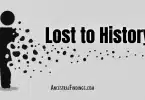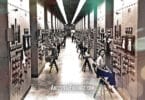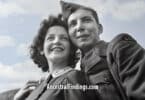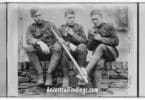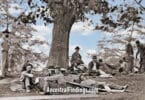If you’ve followed this series from the beginning, you already know this wasn’t really about war. It was about what came after. The quiet years. The long drives to work. The nights spent filling out pension forms by lamplight. The new marriages, new names, new babies, and sometimes, the distance — emotional or physical — that never fully closed.
I’ve spent years digging through military records, just like you. But I’ve come to realize that a veteran’s service file is only half the story. It might tell you where someone was stationed or what battles they were in, but it doesn’t tell you who they became when they came home. And that’s the part their descendants — you and me — need to know to truly understand our family.
We call them veterans, but they were also sons and daughters, brothers and sisters, husbands and wives, neighbors, laborers, wanderers, storytellers, and in some cases… ghosts. Not in the supernatural sense, but in that soft way a person fades out of memory when no one speaks their name anymore.
This series was for them.
They Came Home… and Then What?
That’s the question I kept asking as I wrote each part. What happened next?
Some returned to old jobs. Others started from scratch. A few changed their names and disappeared into a different kind of life, and others never made it home at all — they lived on paper in pensions and hospital admissions, their stories never told around the table.
Some married the people they wrote letters to during the war. Others married strangers, started over, or didn’t marry at all. Some raised children who never knew what they’d done, and others said too much too often, as if trying to talk their memories away.
I saw them in census records, boarding houses, VA hospital admissions, and faded obituaries. Sometimes just a single mention in a church bulletin or a city directory. Sometimes only in the blank space where a name should’ve been — a gap in the timeline, a father never mentioned, a brother who never came home.
But the clues are still there. You just have to know where to look. You’ve probably already found one or two in your own tree while reading this.
What This Taught Me
Writing this series reminded me that there’s no such thing as a small detail. A job title in the 1950 census. A boarding house address in a city directory. A note in a widow’s pension application saying “he was never the same after the war.” These are the pieces that explain why your ancestor lived where they did, worked the job they did, or never talked about what came before.
You might have a grandfather who was always quiet, or a great-uncle who drank too much and left town. Maybe your family has a story about someone who “went out west” and was never heard from again. Maybe there’s a photo in a drawer of a man in uniform no one can name. This is your invitation to look again.
Because some veterans came back and rebuilt everything.
And some just tried to get through the day.
Both deserve to be known.
If You’ve Found One of Them
If this series helped you make a connection — even a small one — I hope you’ll write it down. Share it with your family. Add the story to your tree. Record your thoughts while you’re thinking them. These aren’t just records. They’re people. And they only stay lost if we let them stay quiet.
If you haven’t found your ancestor’s second life yet, keep going. Go back to those overlooked records. Try the directories. Try the tax rolls. Look into union rosters, apprentice listings, land transfers, or cemetery plot books. Try every spelling. Search every variation of their name. And if that doesn’t work, try DNA. Ask the oldest person in your family if they remember a story — even a strange one. Especially a strange one.
Sometimes, it only takes one new clue to bring someone home.
Why It Matters
Because this is where your story begins, too.
That grocery clerk in 1930? He might’ve fixed tanks in Europe. That nurse in the small-town hospital? She might’ve driven a supply truck through Italy. That grandfather who never said much but always fixed things with his hands? Maybe he started doing that in a Navy workshop at nineteen.
Understanding who they were after the war helps us understand who we are now.
That’s the gift of family history.
And if we don’t tell these stories, who will?

